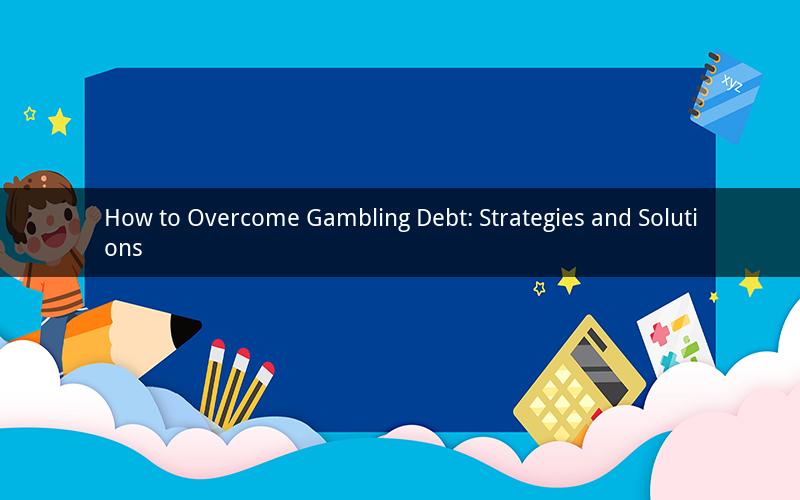
Introduction:
Gambling debt is a pressing issue that affects many individuals and families worldwide. It can lead to severe financial, emotional, and social problems. This article explores various strategies and solutions on how to deal with gambling debt effectively.
1. Assess the Severity of Your Gambling Debt
Understanding the extent of your gambling debt is crucial in devising an appropriate plan. Start by gathering all your gambling-related financial statements and calculating the total debt amount. This will give you a clear picture of the problem and help you set realistic goals.
2. Seek Professional Help
Dealing with gambling debt can be overwhelming. It's essential to seek professional help to navigate through this challenging situation. Consider consulting with a financial advisor, therapist, or a debt counselor specializing in gambling addiction. They can provide tailored advice and support throughout the process.
3. Create a Budget
Developing a budget is a critical step in managing gambling debt. List all your income sources, expenses, and debts. Prioritize essential expenses like rent, utilities, groceries, and transportation. Allocate a portion of your income towards paying off your gambling debt, ensuring that you're not neglecting other financial responsibilities.
4. Cut Down on Unnecessary Expenses
Identify areas where you can cut down on unnecessary expenses to allocate more funds towards your gambling debt. This might include canceling subscriptions, reducing entertainment spending, and finding more affordable alternatives for daily needs. By reducing your expenses, you can increase the amount you can allocate towards paying off your debt.
5. Explore Debt Consolidation Options
Debt consolidation can help simplify your debt repayment process by combining multiple debts into a single, more manageable payment. Research various consolidation options, such as personal loans, credit card balance transfers, or consolidation loans specifically designed for gambling debt. Ensure that the terms of the consolidation loan are favorable and will help you pay off your debt more efficiently.
6. Establish an Emergency Fund
While focusing on paying off your gambling debt, it's essential to create an emergency fund to prevent future financial problems. Aim to save three to six months' worth of living expenses in a separate savings account. This fund will help you cover unexpected expenses and reduce the temptation to gamble again.
7. Develop Coping Mechanisms
Gambling addiction often stems from underlying emotional or psychological issues. Developing healthy coping mechanisms is crucial in preventing relapse. Consider engaging in activities that promote relaxation, such as exercise, meditation, or hobbies. Seeking therapy or joining support groups can also provide you with emotional support and coping strategies.
8. Communicate with Your Loved Ones
Dealing with gambling debt can strain relationships with family and friends. Openly communicate your situation with them, expressing your commitment to overcoming your addiction and managing your debt. Ask for their support and understanding during this challenging time.
9. Stay Accountable
To prevent future gambling relapses and debt accumulation, it's essential to stay accountable. Inform trusted friends or family members about your progress and setbacks. Consider using apps or devices that monitor and limit your gambling activities.
10. Celebrate Milestones
Recognize and celebrate your progress in overcoming gambling debt. Set milestones and reward yourself for achieving them. This will help maintain your motivation and keep you focused on your ultimate goal of becoming debt-free.
Frequently Asked Questions:
1. Q: How long does it take to pay off gambling debt?
A: The time it takes to pay off gambling debt depends on various factors, including the amount of debt, your income, and your ability to cut expenses. It can take several months to years to become debt-free.
2. Q: Can I negotiate with my creditors to reduce my gambling debt?
A: Yes, you can negotiate with your creditors to lower your interest rates, extend the repayment period, or even settle a portion of your debt. However, it's essential to approach these negotiations with a clear plan and be prepared to provide financial documentation.
3. Q: Is bankruptcy an option for dealing with gambling debt?
A: Bankruptcy can be an option for dealing with gambling debt, but it's not without consequences. It can negatively impact your credit score and may result in the loss of certain assets. Consult with a bankruptcy attorney to understand the potential implications and explore other options first.
4. Q: Can I recover lost money from gambling?
A: Recovering lost money from gambling is highly unlikely, as casinos are designed to profit from gamblers. However, you can seek assistance from support groups or professionals who can help you address the emotional and psychological aspects of your gambling addiction.
5. Q: How can I prevent gambling addiction in the future?
A: To prevent gambling addiction in the future, it's essential to address the underlying factors that trigger your addictive behavior. Seek therapy, develop healthy coping mechanisms, and establish strict boundaries regarding gambling. Surround yourself with supportive friends and family who can encourage and remind you of your goals.